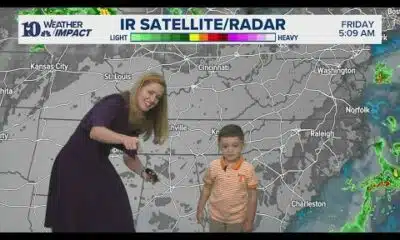News from the South - North Carolina News Feed
Briner hopeful AI will improve efficiency of state treasurer’s office
RALEIGH — In summer 1997, well before Brad Briner became state treasurer, he worked as an intern at the investment banking company Goldman Sachs.
While he was there, Briner needed to acquire data from the U.S. Department of Agriculture. His supervisor offered him a plane ticket to the nation’s capital and told him to go down to the USDA building to comb through paper records and get the information he needed.
But the late 1990s marked a new age in technology. Briner knew there was a more efficient way to get the job done.
“I turned to him and said: ‘Hey, there’s this thing called the internet and I can actually just pull it for you right here,’” Briner recalled.
[Subscribe for FREE to Carolina Public Press’ alerts and weekend roundup newsletters]
Now, the Republican thinks the country is on the cusp of another one of those moments with the emergence of artificial intelligence — and he doesn’t want North Carolina stuck in the past.
To that end, in late March, Briner announced the launch of a 12-week pilot program in partnership with industry-leading company OpenAI to explore how artificial intelligence can be integrated into the work of the Office of the State Treasurer.
The announcement was made amid a push from state lawmakers to pass regulations on the use of AI in industries such as health care.
The contrast in approaches is representative of a larger national debate over the technology.
As artificial intelligence rapidly integrates into the private sector, public officials are exploring the best, and safest, ways to use the technology.
‘First of its kind’
The public-private partnership was hailed as the “first of its kind” following a flashy press conference to announce the initiative at N.C. Central University, but this is far from OpenAI’s first venture into government affairs.
For at least five years now, the federal government has been working towards integrating AI into its workforce under both Democratic and Republican administrations.
It started with a December 2020 executive order from Donald Trump that mandated departments and agencies “design, develop, acquire and use AI in a manner that fosters public trust and confidence while protecting privacy, civil rights, civil liberties and American values.”
Joe Biden continued that goal during his presidency by promising to hire 500 AI experts across the federal workforce by the end of fiscal year 2025.
And Trump has picked up right where he left off since returning to office.
On April 3, the Office of Management and Budget issued further guidance to federal agencies on acquisition and use of AI tools in accordance with Trump’s original order from 2020.
Starting last year, OpenAI announced a year-long pilot program with 14 state agencies in Pennsylvania. In March, Democratic Gov. Josh Shapiro called the program’s results “highly positive,” with average time savings of 95 minutes per day.
North Carolina is the next state to follow suit through its pilot program at the treasurer’s office.
The agency might not seem like an obvious candidate for an AI-powered makeover, but Briner, who was elected as a Republican in November, has an approach to finance that is not traditionally conservative. During his campaign, he criticized his predecessors for their risk-averse investment strategies he claimed consistently underperformed compared to other states. Briner has also advocated investing part of the state’s pension fund in cryptocurrency.
But despite the buzz and uncertainty associated with artificial intelligence, Briner said this partnership with OpenAI is anything but risky. Instead, it’s more like his office is trying to see if it’s a good fit.
Future for Briner is now
There are no legally binding ties or financial promises between the two parties yet.
Briner and OpenAI chief economic officer Ronnie Chatterji — a Durham resident and former Duke professor — signed a 12-week, non-binding memorandum of understanding that laid out the limited scope of the pilot program.
Notably, Chatterji ran as the Democratic candidate for state treasurer in 2020 and lost to Republican incumbent Dale Folwell. He and Briner also served together on the finance committee of a private school their children attended.
The memorandum of understanding signed by Briner and Chatterji states that the department will not pay OpenAI for any “off-the-shelf” use of ChatGPT — OpenAI’s flagship AI chatbot. But they may come to a separate payment agreement for more advanced integration of OpenAI’s technology.
The agreement does not get into much detail about what happens at the end of the program other than saying that the agency will deliver a final report of its findings and future recommendations.
Briner told CPP he is not committed to continuing with the program unless he sees “productivity growth” in the coming weeks.
Briner promises to be ‘respectful steward’
Briner assured that one of his top priorities in overseeing the program is being a “respectful steward of data,” and the agreement stipulates that OpenAI will not be given access to private information.
That is one “bright red line” Briner promised the initiative wouldn’t cross.
“The big issue with AI in state government,” Briner said, “is one that we are deliberately side-stepping, which is how do you ensure data privacy for non-public data in the context of using AI? That’s a big, thorny, complicated question, but we wanted to see if we could get tremendous productivity out of this tool by applying it only in the divisions where we don’t use private data.”
So the OpenAI program will focus on publicly-available datasets such as unclaimed property held by the state and the financial audits of local governments.
The state treasurer oversees an unclaimed property fund that holds more than $1.4 billion consisting of, among other things, bank accounts, wages and contents of safe deposit boxes that have been abandoned for years and turned over to the state. North Carolina runs a program called NC Cash dedicated to returning unclaimed funds to their owners.
Briner said that the division could use OpenAI’s tools to perform deep data searches to more easily identify and return property.
Moreover, the State and Local Government Finance Division, which audits the more than 1,100 units of local government in North Carolina each fiscal year, could use AI to flag potential financial issues.
Still, exactly how artificial intelligence technology would be used hasn’t been hammered out yet, but Briner said the goal is to see if the productivity in those two divisions will have improved by the time the pilot program expires in mid-May.
A hard line on software
Over at the state legislature, lawmakers appear to be more wary of artificial intelligence.
A couple of bills filed this year by state Sen. Jim Burgin aims to place more regulations over the use of AI chatbots.
“I’m really concerned about AI overall and the speed (at which it’s growing),” said Burgin, a Republican from Harnett County who has been a leader in the General Assembly on AI-focused policy. “It’s almost like one of those Chia heads. It’s got a little bit of water and it’s growing everywhere, and we need to think about that.”
One of the bills sponsored by Burgin — Senate Bill 624 — would require operators of AI-powered chatbots in the health care sector to be licensed by the state. It would also require operators of any chatbot to inform users that the computer program is “not human, human-like or sentient.”
Furthermore, it would give a state attorney general the power to sue chatbot operators in violation of those regulations.
A spokesman for Attorney General Jeff Jackson declined to comment on the bill other than to say that the office was “currently reviewing” the legislation.
Burgin, who is the president and owner of an insurance company, said he’s not opposed to the use of AI. What he’s trying to do is put up guardrails to prevent harmful misuse of the emerging technology.
“Do I think that there’s some exciting things about it? Yeah, I think there’s unlimited possibilities.”
This article first appeared on Carolina Public Press and is republished here under a Creative Commons Attribution-NoDerivatives 4.0 International License.
The post Briner hopeful AI will improve efficiency of state treasurer’s office appeared first on carolinapublicpress.org
News from the South - North Carolina News Feed
Trump threatens 35% tariffs on Canada
SUMMARY: President Trump has threatened to impose 35% tariffs on many Canadian imports starting August 1, accusing Canada of failing to curb fentanyl flow and imposing trade barriers. Trump warned that if Canada raises its tariffs, the U.S. will increase its rate accordingly. Although Customs and Border Patrol reports only 1% of fentanyl seized in the U.S. comes from Canada, Trump remains critical. Canadian Prime Minister Mark Carney defended Canadian workers and businesses, emphasizing ongoing negotiations before the August 1 deadline. The tariff move follows failed trade deal negotiations, with Trump issuing similar tariffs on Brazil, Cambodia, and copper imports.
President Donald Trump announced the tariffs in a letter on Thursday but said the U.S. would consider adjusting its stance if Canada helps stop the flow of fentanyl between the two countries.
More: https://abc11.com/
Download: https://abc11.com/apps/
Like us on Facebook: https://www.facebook.com/ABC11/
Instagram: https://www.instagram.com/abc11_wtvd/
Threads: https://www.threads.net/@abc11_wtvd
TIKTOK: https://www.tiktok.com/@abc11_eyewitnessnews
News from the South - North Carolina News Feed
Mebane residents still under tight water restrictions
SUMMARY: Mebane residents remain under strict water restrictions after flooding damaged the city’s water treatment plant. Since Wednesday, water use has been limited, with businesses mostly closed, losing revenue and time. On Thursday, officials allowed businesses to reopen with 60% workforce capacity and permitted water use but required a 60% reduction. Water production is slowly returning, yet full restoration and repair timelines remain unclear. Residents rely heavily on bottled water and can only shower with water. Local businesses are adapting, including repurposing downtown as a water distribution center, while the community awaits a resolution.
Water production has slowly started returning. But as WRAL’s Carly Haynes reports, businesses and neighbors are still having to find ways to get by.
News from the South - North Carolina News Feed
North Carolina’s racial gerrymandering trial ends with dueling expert testimony
SUMMARY: A federal trial in Winston-Salem reviewed claims that North Carolina’s 2023 election district maps dilute Black voting power, violating federal law. Civil rights groups and voters argued Republican legislators racially gerrymandered districts to reduce Black voters’ influence, especially in the Piedmont Triad, Mecklenburg County, and eastern NC’s 1st Congressional District. Lawyers cited a drop in districts where Black voters could elect preferred candidates, despite population growth. Republicans contended districts were drawn for partisan advantage, not race. Expert witnesses debated whether race or partisanship drove redistricting. The three-judge panel, appointed by Republican presidents, will rule by early August.
The post North Carolina’s racial gerrymandering trial ends with dueling expert testimony appeared first on ncnewsline.com
-
News from the South - Georgia News Feed7 days ago
'Big Beautiful Bill' already felt at Georgia state parks | FOX 5 News
-
The Center Square7 days ago
Alcohol limits at odds in upcoming dietary guidelines | National
-
The Center Square5 days ago
Here are the violent criminals Judge Murphy tried to block from deportation | Massachusetts
-
News from the South - Kentucky News Feed5 days ago
Woman arrested in Morgantown McDonald’s parking lot
-
News from the South - Texas News Feed6 days ago
Hill Country flooding: Here’s how to give and receive help
-
News from the South - North Carolina News Feed6 days ago
Raleigh caps Independence Day with fireworks show outside Lenovo Center
-
News from the South - Missouri News Feed7 days ago
Shannon County Sheriff alleges ‘orchestrated campaign of harassment and smear tactics,’ threats to life
-
Our Mississippi Home7 days ago
The Other Passionflower | Our Mississippi Home










































